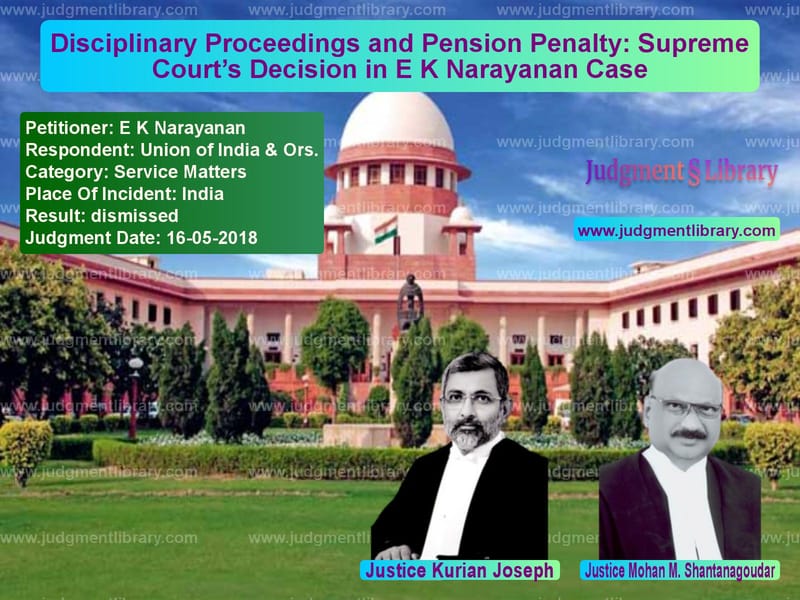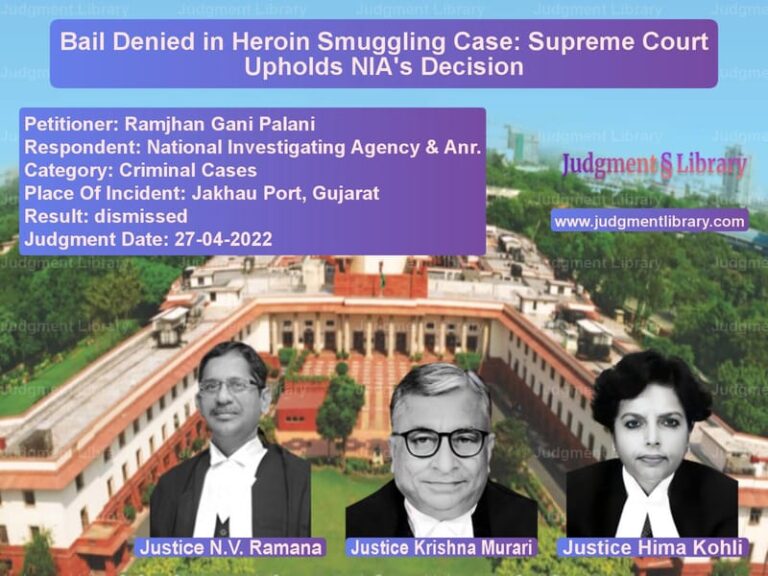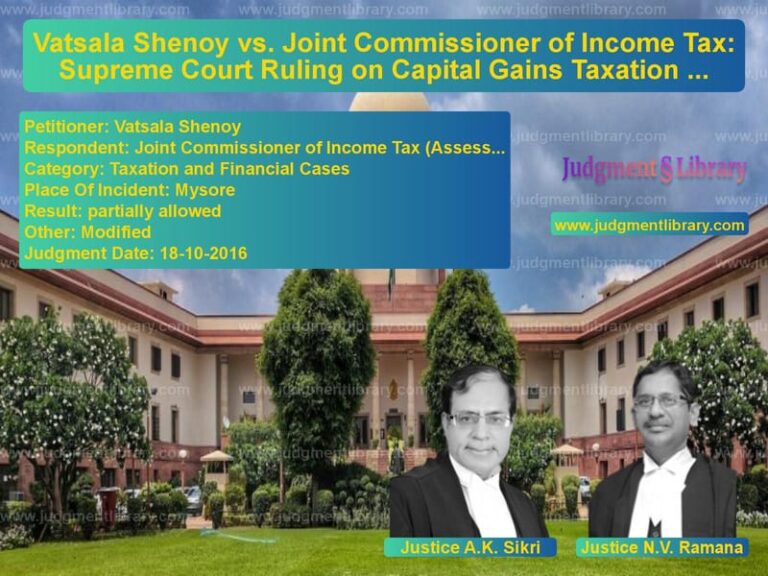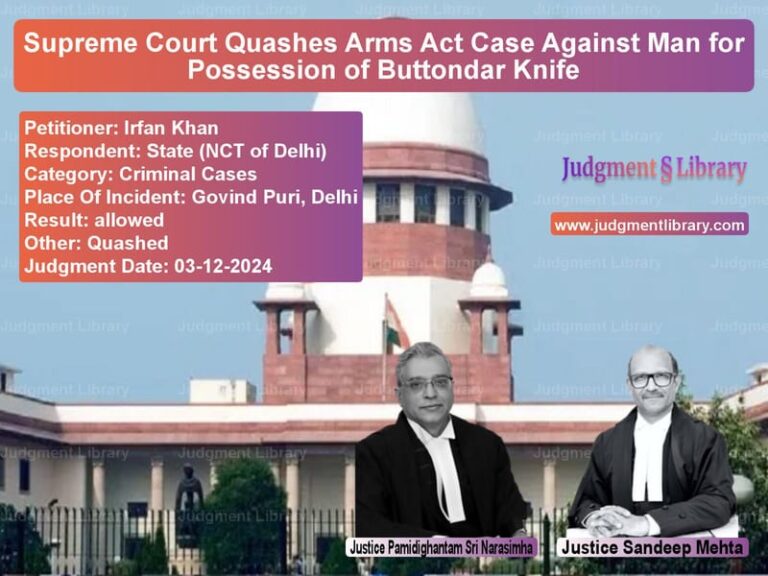Disciplinary Proceedings and Pension Penalty: Supreme Court’s Decision in E K Narayanan Case
The case of E K Narayanan vs. Union of India & Ors. revolves around disciplinary proceedings initiated against the appellant, a retired government employee, and the subsequent penalty imposed on his pension. The Supreme Court had to decide whether the penalty imposed on the appellant was justified and whether he had the right to seek further legal remedies.
The appellant challenged the disciplinary proceedings, arguing that the punishment of withholding 15% of his monthly pension for one year was unjust. The Supreme Court disposed of the appeal without interfering with the penalty but granted the appellant the liberty to pursue his remedies as per law.
Background of the Case
The case originated from disciplinary proceedings against E K Narayanan, a retired government official. The Union of India imposed a penalty on his pension, citing misconduct during his service period.
The key aspects of the case include:
- The appellant was subjected to disciplinary proceedings after retirement.
- The proceedings resulted in a penalty of withholding 15% of his monthly pension for one year.
- The appellant challenged the penalty before the High Court of Kerala.
- The High Court dismissed his appeal, leading him to approach the Supreme Court.
- During the Supreme Court hearing, the respondent’s counsel confirmed that the disciplinary proceedings had been concluded.
Key Legal Issues Considered
The Supreme Court examined the following legal issues:
- Whether disciplinary proceedings can be initiated against a retired government employee.
- Whether withholding a portion of the appellant’s pension was legally justified.
- Whether the appellant had the right to challenge the penalty further.
Arguments of the Parties
Petitioner’s (E K Narayanan) Arguments
The appellant contended:
- The disciplinary proceedings were unfair and should not have been initiated after his retirement.
- The penalty of withholding 15% of his pension was excessive and unjustified.
- The High Court failed to consider key aspects of his case before dismissing his appeal.
- He should be allowed to contest the penalty through further legal remedies.
Respondent’s (Union of India) Arguments
The Union of India, represented by senior counsel, countered:
- The disciplinary proceedings were conducted in accordance with service rules.
- The penalty imposed was within the permissible limits under pension regulations.
- The appellant had already been given an opportunity to defend himself during the proceedings.
- The High Court’s decision to uphold the penalty was legally sound.
Supreme Court’s Ruling
The Supreme Court ruled as follows:
“These appeals are disposed of without prejudice to the liberty available to the appellant to pursue his remedies in accordance with law.”
The Court did not interfere with the penalty imposed on the appellant but clarified that he was free to explore further legal avenues.
The ruling emphasized:
- Disciplinary proceedings against retired government employees are valid under service regulations.
- Penalties on pensions must follow due process.
- The appellant retains the right to seek further remedies if he believes the penalty was unjust.
Key Takeaways from the Judgment
- Government employees can face disciplinary action even after retirement.
- Penalties on pensions must be imposed within the framework of service rules.
- The Supreme Court refrained from interfering in the penalty but allowed the appellant to seek further legal remedies.
- The decision reaffirms that procedural fairness is critical in disciplinary actions.
Conclusion
The Supreme Court’s judgment in this case highlights the legal principles governing disciplinary proceedings against retired government employees. While the Court did not overturn the penalty, it ensured that the appellant retained his right to contest the decision through appropriate legal channels.
The ruling underscores the importance of procedural fairness and adherence to service rules in disciplinary matters, particularly those affecting pension benefits.
Petitioner Name: E K Narayanan.Respondent Name: Union of India & Ors..Judgment By: Justice Kurian Joseph, Justice Mohan M. Shantanagoudar.Place Of Incident: India.Judgment Date: 16-05-2018.
Don’t miss out on the full details! Download the complete judgment in PDF format below and gain valuable insights instantly!
Download Judgment: E K Narayanan vs Union of India & Ors Supreme Court of India Judgment Dated 16-05-2018.pdf
Direct Downlaod Judgment: Direct downlaod this Judgment
See all petitions in Pension and Gratuity
See all petitions in Disciplinary Proceedings
See all petitions in Public Sector Employees
See all petitions in Judgment by Kurian Joseph
See all petitions in Judgment by Mohan M. Shantanagoudar
See all petitions in dismissed
See all petitions in supreme court of India judgments May 2018
See all petitions in 2018 judgments
See all posts in Service Matters Category
See all allowed petitions in Service Matters Category
See all Dismissed petitions in Service Matters Category
See all partially allowed petitions in Service Matters Category







